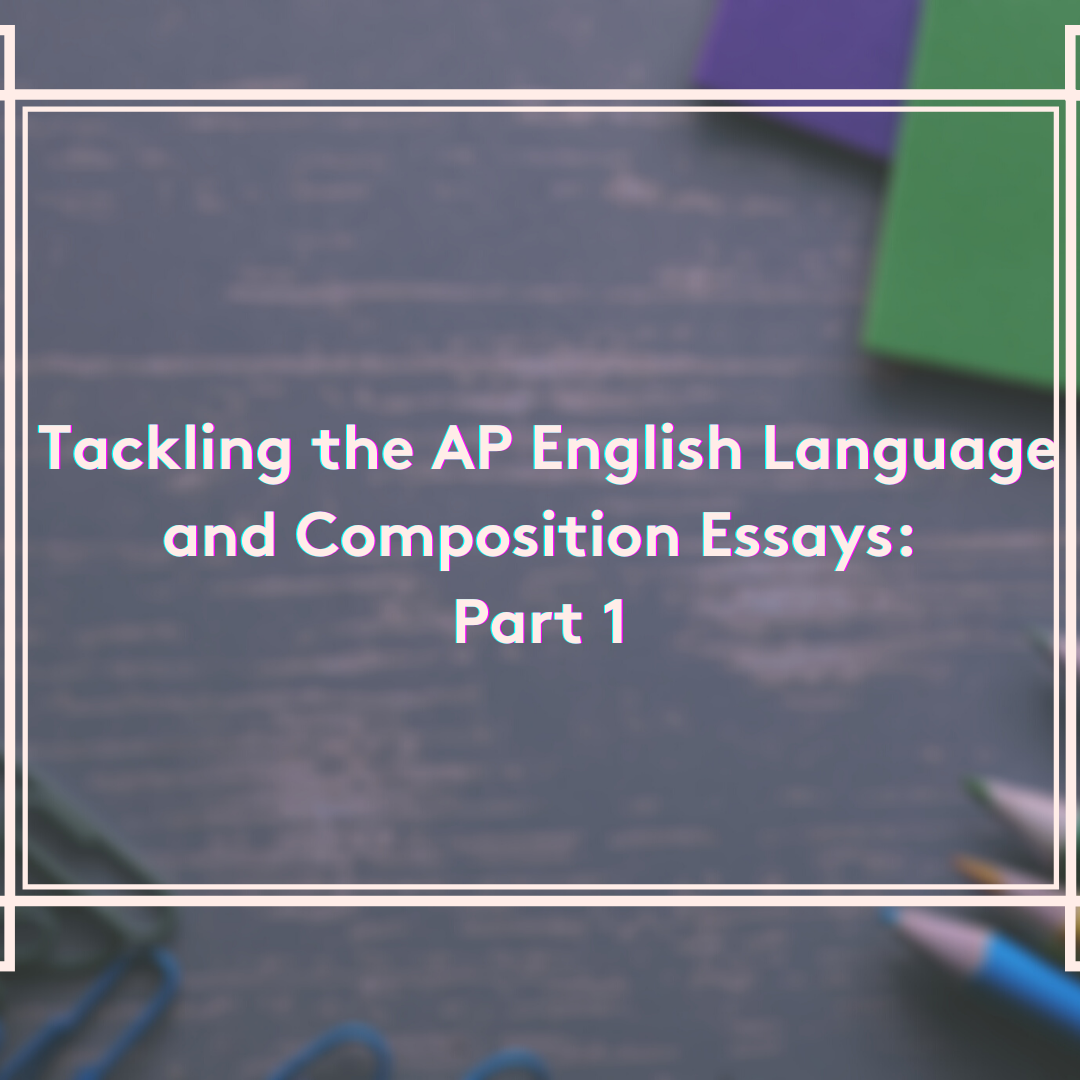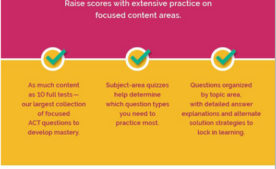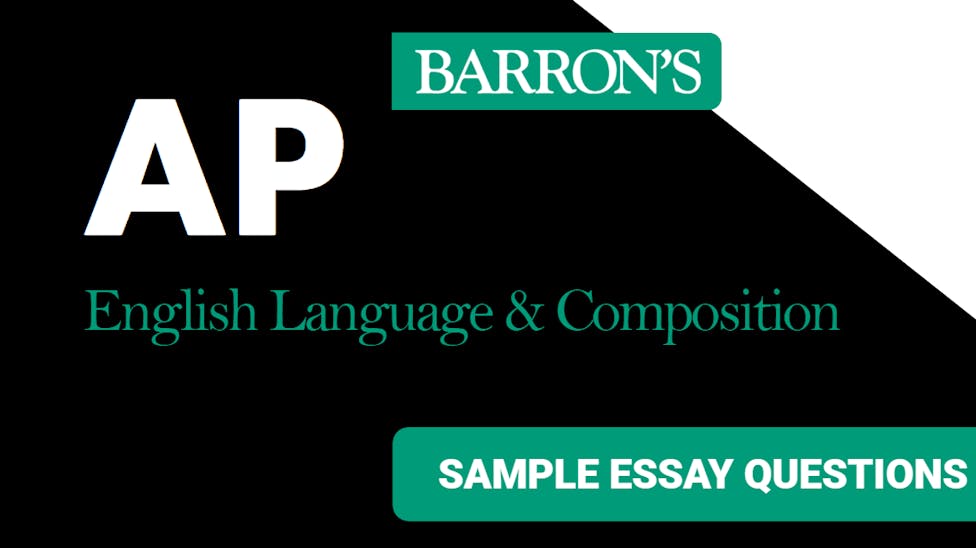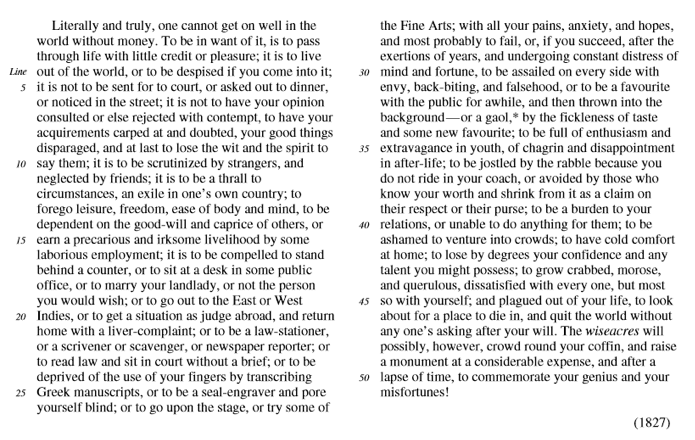

Expert Guide to the AP Language and Composition Exam

The AP Language and Composition Exam is a comprehensive assessment of students' reading, writing, and critical thinking skills. Here is an expert guide to help you navigate and excel in this exam:
1. Exam Format: The AP Language and Composition Exam consists of multiple-choice questions and free-response tasks. The multiple-choice section tests your reading comprehension and analysis skills, while the free-response section assesses your ability to write coherent and persuasive essays.
2. Analyzing Rhetorical Strategies: A key focus of the exam is analyzing and understanding rhetorical strategies used in various texts. This includes identifying and evaluating techniques such as ethos, pathos, logos, and rhetorical devices like imagery, figurative language, and tone. Practice analyzing different types of texts, including speeches, articles, essays, and advertisements.
3. Essay Writing Skills: The free-response section requires you to write three essays: a synthesis essay, a rhetorical analysis essay, and an argument essay. Develop strong essay writing skills, including thesis development, evidence selection, and paragraph organization. Practice constructing well-structured, coherent, and persuasive arguments within the given time constraints.
4. Close Reading and Annotation: Effective close reading and annotation skills are crucial for success in the exam. Learn to identify the main ideas, key details, and rhetorical elements in the provided passages. Annotate the text to mark important points, make connections, and track your understanding of the author's purpose and argument.
5. Vocabulary and Grammar: Enhance your vocabulary and grammar skills to express your ideas clearly and precisely. Use varied and appropriate language to convey your analysis and arguments effectively. Pay attention to sentence structure, punctuation, and word choice to ensure coherence and precision in your writing.
6. Practice and Timed Mock Exams: Regular practice is essential to build your skills and confidence. Take timed mock exams to simulate the exam conditions and develop your time management skills. Review your performance, identify areas for improvement, and seek feedback from teachers or peers.
7. Read Widely: Expand your reading repertoire by engaging with diverse texts from different genres and time periods. Reading extensively will improve your comprehension, vocabulary, and ability to recognize different writing styles and rhetorical strategies.
8. Critical Thinking and Analysis: Develop your critical thinking skills by analyzing the effectiveness of arguments, evaluating evidence, and recognizing biases and logical fallacies. Practice constructing well-reasoned arguments and counterarguments to strengthen your analysis.
9. Stay Updated with Current Events: Stay informed about current events and societal issues as they often form the basis of essay prompts and analysis passages. Familiarize yourself with contemporary debates, social, and political issues, and be prepared to apply your knowledge to the exam questions.
10. Seek Resources and Guidance: Utilize available resources, such as study guides, practice exams, and online resources, to enhance your preparation. Seek guidance from teachers, tutors, or peers to clarify any doubts and improve your understanding of the exam requirements.
The AP English Language and Composition Multiple-Choice
The multiple-choice section of the AP English Language and Composition exam assesses your reading comprehension and analysis skills. Here are some key points to understand and excel in this section:
1. Format and Structure: The multiple-choice section consists of a series of passages followed by a set of questions. The passages can include a variety of genres such as essays, speeches, articles, and excerpts from books or plays. Each passage is accompanied by multiple-choice questions that require you to analyze the author's purpose, rhetoric, and style.
2. Close Reading: Effective close reading is crucial for success in the multiple-choice section. Read the passages carefully, paying attention to details, tone, and the author's use of rhetorical devices. Underline or annotate important sections to help you remember key points and refer back to them when answering the questions.
3. Understanding Rhetorical Devices: Familiarize yourself with common rhetorical devices such as ethos, pathos, logos, irony, figurative language, and tone. These devices are frequently used by authors to convey their message and persuade the reader. Be prepared to identify and analyze how these devices contribute to the author's overall argument or purpose.
4. Analyzing Text Structure: Pay attention to the structure of the passages, including the organization of ideas, transitions, and the use of evidence. Identify the main idea, supporting details, and the logical flow of the author's argument. Understanding the structure of the passage will help you answer questions related to the author's intent and the development of their ideas.
5. Answering Strategies: Develop effective strategies for approaching multiple-choice questions. Read each question carefully, making sure to consider all the answer choices before selecting the best option. Pay attention to qualifiers such as "most likely," "least likely," "best supports," etc. Eliminate clearly incorrect choices and make an educated guess if you are unsure.
6. Time Management: The multiple-choice section is timed, so it is important to manage your time effectively. Pace yourself and allocate a specific amount of time for each passage and its corresponding questions. If you encounter a challenging question, mark it and move on, returning to it later if time permits.
7. Practice with Sample Questions: Familiarize yourself with the types of questions commonly asked in the AP English Language and Composition exam by practicing with sample questions. This will help you become more comfortable with the format and style of the questions and improve your ability to identify key elements in the passages.
8. Review Test-Taking Strategies: In addition to content knowledge, review general test-taking strategies that can improve your performance. This includes strategies for eliminating answer choices, using process of elimination, and managing your time effectively.
The AP English Language and Composition Free Response
The free response section of the AP English Language and Composition exam is designed to assess your ability to analyze and respond to rhetorical prompts effectively. Here are some key points to understand and excel in this section:
1. Format and Structure:
The free response section consists of three essay prompts: a synthesis essay, a rhetorical analysis essay, and an argument essay. Each prompt presents you with a specific task and requires you to analyze and respond to a given passage or passages.
2. Synthesis Essay:
In this essay, you are asked to combine information from multiple sources to create a coherent and well-supported argument. You must demonstrate your ability to understand and synthesize different perspectives on a given topic. It is important to analyze the sources critically, identify their main arguments, and use evidence from the sources to support your own argument.
3. Rhetorical Analysis Essay:
In this essay, you are required to analyze the rhetorical strategies employed by the author of a given passage. You need to identify and explain the author's use of rhetorical devices, such as ethos, pathos, logos, figurative language, and tone. Your analysis should focus on how these devices contribute to the author's overall argument and purpose.
4. Argument Essay:
In this essay, you are expected to construct and support your own argument on a given topic. You must develop a clear and coherent thesis statement, provide relevant evidence, and effectively address counterarguments. It is important to use persuasive techniques and rhetorical devices to strengthen your argument.
5. Organization and Structure:
Structure your essays in a clear and logical manner. Each essay should have an introduction that presents your thesis statement, body paragraphs that support your thesis with evidence and analysis, and a conclusion that summarizes your main points and reinforces your argument. Use topic sentences and transitions to ensure a smooth flow of ideas.
6. Evidence and Analysis:
Support your claims and arguments with evidence from the given passages or external sources. Use specific examples, quotes, and references to demonstrate your understanding and provide strong evidence for your analysis. Avoid making unsupported generalizations or relying solely on personal opinions.
7. Time Management:
The free response section is time-limited, so it is crucial to manage your time effectively. Allocate a specific amount of time for each essay and stick to it. Leave some time at the end to review and revise your essays for clarity, coherence, and grammatical correctness.
8. Practice and Preparation:
Familiarize yourself with the expectations and requirements of each essay type by practicing with past exam prompts and sample essays. Pay attention to the scoring guidelines provided by the College Board to understand how your essays will be evaluated. Seek feedback from teachers or peers to improve your writing skills and address any weaknesses.
AP English Language Prep Tips
Preparing for the AP English Language exam requires a strategic approach to enhance your reading, writing, and analytical skills. Here are some detailed tips to help you excel in your preparation:
1. Read Widely:
Develop a habit of reading a variety of texts, including fiction, non-fiction, essays, newspaper articles, and editorials. This will expose you to different writing styles, perspectives, and rhetorical devices. Pay attention to the author's tone, purpose, and argumentative strategies.
2. Analyze Rhetorical Devices:
Familiarize yourself with common rhetorical devices such as ethos, pathos, logos, figurative language, and rhetorical appeals. Practice identifying these devices in various texts and analyze how they contribute to the author's message and overall effectiveness.
3. Expand Vocabulary:
Enhance your vocabulary by reading challenging texts and keeping a vocabulary notebook. Learn new words, their definitions, and how they are used in context. Utilize these words in your writing to demonstrate a strong command of language.
4. Practice Timed Writing:
Time yourself while writing essays to simulate the exam conditions. Aim to complete essays within the time limit while maintaining clarity and coherence. Practice different essay types, such as synthesis, rhetorical analysis, and argument essays, to strengthen your skills in each area.
5. Read Sample Essays:
Study well-written sample essays from previous AP exams to understand the expectations and scoring criteria. Analyze their structure, use of evidence, and clarity of argument. Take note of effective introductions, strong thesis statements, and well-supported analysis.
6. Develop Writing Strategies:
Learn to effectively structure your essays with clear introductions, body paragraphs, and conclusions. Use topic sentences, transitions, and evidence to support your claims. Craft strong thesis statements that clearly state your position and guide your essay.
7. Analyze Visual Texts:
Practice analyzing visual texts such as graphs, charts, and images. Understand how visual elements convey information, make arguments, and support claims. Pay attention to the intended audience and the overall impact of visual texts.
8. Practice Multiple-Choice Questions:
Regularly practice multiple-choice questions to improve your reading comprehension and analysis skills. Read passages carefully, annotate as you go, and answer questions based on the given information. Pay attention to details, context, and authorial intent.
9. Seek Feedback:
Share your essays with teachers or peers and seek constructive feedback. Learn from their suggestions to improve your writing skills and address any weaknesses. Consider joining or forming study groups to discuss and analyze different texts and essay prompts.
10. Review Grammar and Mechanics:
Brush up on grammar rules and punctuation to ensure your writing is clear and error-free. Pay attention to sentence structure, verb tense, subject-verb agreement, and pronoun usage. A strong command of grammar enhances the clarity and effectiveness of your writing.
Remember that consistent practice, focused study, and critical reading are key to success in the AP English Language exam. Develop a study schedule, allocate time for reading and writing practice, and stay disciplined in your preparation. With dedication and effort, you can improve your skills and perform well on the exam.
AP Language and Composition Test Day Tips
On the day of the AP Language and Composition exam, it's important to be well-prepared and approach the test with confidence. Here are some detailed tips to help you make the most of your test day:
1. Get a Good Night's Sleep:
Ensure you have a restful night's sleep before the exam day. Being well-rested will help you stay focused and maintain mental clarity throughout the test.
2. Eat a Nutritious Breakfast:
Start your day with a healthy and balanced breakfast. Fueling your body with nutritious food will provide you with the energy you need for the duration of the exam.
3. Arrive Early:
Plan to arrive at the exam location early to avoid any unnecessary stress. Familiarize yourself with the exam venue and locate your assigned room beforehand.
4. Bring Necessary Materials:
Double-check that you have all the required materials for the exam, such as your admission ticket, identification, pens, pencils, erasers, and a watch to keep track of time. Be aware of any specific items allowed or prohibited by the testing guidelines.
5. Read Instructions Carefully:
Take the time to carefully read the instructions provided on the exam booklet and answer sheet. Understand the format, timing, and specific requirements for each section of the test.
6. Pace Yourself:
Time management is crucial in the AP Language and Composition exam. Allocate your time wisely, making sure to complete each section within the specified time limits. Pace yourself and avoid spending too much time on any single question or passage
7. Skim the Questions First:
Before diving into the reading passages, quickly skim the multiple-choice questions to get a sense of what to look for as you read. This can help you focus your attention and save time while reading and analyzing the passages.
8. Read Actively and Annotate:
As you read the passages, actively engage with the text. Underline key points, annotate important details, and mark passages that you may want to refer back to later. This will help you remember crucial information and facilitate your analysis.
9. Plan Your Essays:
For the essay sections, take a few minutes to plan your response before writing. Outline your main points, supporting evidence, and a clear thesis statement. This will provide structure to your essay and ensure a more coherent and organized response.
10. Review Your Work:
If time permits, take a moment to review your answers before submitting your exam. Check for any errors or incomplete responses, and make any necessary corrections or additions. Ensure that you have followed the instructions and provided clear and concise answers.
11. Stay Calm and Focused:
Throughout the exam, maintain a calm and focused mindset. Manage test anxiety by taking deep breaths, maintaining a positive attitude, and focusing on the task at hand. Remember that you have prepared for this exam and trust in your abilities.
12. Follow Exam Regulations:
Adhere to the exam regulations and guidelines provided by the College Board. Maintain academic integrity by refraining from any prohibited behavior, such as cheating or using unauthorized materials.
By following these tips, you can approach the AP Language and Composition exam with confidence and maximize your chances of success. Remember to stay calm, trust your preparation, and showcase your skills in analyzing and responding to complex texts. Good luck!
In conclusion, the AP Language and Composition exam can seem challenging, but with the right preparation and approach, you can excel. Understanding the exam format, practicing multiple-choice questions, mastering the free response section, and developing strong analytical and writing skills are essential for success. Additionally, following test day tips and maintaining a calm and focused mindset will help you perform at your best. By leveraging these insights and strategies, you can navigate the AP Language and Composition exam with confidence and achieve a high score. Good luck on your exam!
You Might Also Like

Guidelines To Write Impressive High School Resume
Know some important guidelines will help you write an effective high school resume that will stand out in the crowd. Check out resume sample here

The Ultimate Guide to College Interviews
College interviews, although nerve wrecking, can be the best chance for you to impress the admissions officer. We give you tips on how to ace your interview.

A Brief Introduction to College Scholarships
Do you know how to win college scholarship? Know detail information about college scholarship & how to get scholarship successfully? - Read our blog carefully

Free Resources
TR Istanbul
Recently viewed courses
Recently viewed.
Find Your Dream School
This site uses various technologies, as described in our Privacy Policy, for personalization, measuring website use/performance, and targeted advertising, which may include storing and sharing information about your site visit with third parties. By continuing to use this website you consent to our Privacy Policy and Terms of Use .
COVID-19 Update: To help students through this crisis, The Princeton Review will continue our "Enroll with Confidence" refund policies. For full details, please click here.
Enter your email to unlock an extra $25 off an SAT or ACT program!
By submitting my email address. i certify that i am 13 years of age or older, agree to recieve marketing email messages from the princeton review, and agree to terms of use., guide to the ap english language and composition exam.

Can you apply the rhetorical triangle to a piece of writing? Are you able to argue a position? The AP ® English Language and Composition exam tests topics and skills discussed in your Advanced Placement English Language course. If you score high enough, your AP English Language score could earn you college credit!
Check out our AP English Language Guide for what you need to know about the exam:
- Exam Overview
- Sections and Question Types
- How to Prepare
What’s on the AP English Language & Composition Exam?
The College Board is very detailed in what they require your AP teacher to cover in his or her AP English Language & Composition course. The exam tests your abilities to understand how authors use rhetoric and language to convey their purpose. Students are also expected to apply these techniques to their own writing and research projects. Some of the major skills tested include the ability to:
- Identify an author’s purpose and intended audience
- Recognize rhetorical devices and strategies in an author’s work
- Demonstrate understanding of citations in research papers
- Apply these skills and techniques to their own writing
- Create and organize an argument defended with evidence and reasoning
- Plan, write, and revise cogent, well-written essays
Check out our line of AP guides for a comprehensive content review.
AP English Language Sections & Question Types
The AP English Language & Composition exam is 3 hours and 15 minutes long and consists of two sections: a multiple-choice section and a free response section.
Read More: Review for the exam with our AP English Language Crash Course
Multiple-Choice
For AP English Language multiple-choice questions, you are presented with two Reading Passages and three Writing passages. The two Reading passages are nonfiction passages taken from all sorts of works. The idea is to get you to focus on rhetorical devices, figures of speech and intended purposes, under rigid time constraints and with material you haven’t seen before. The three Writing passages are student-produced essays. The idea is to get you to revise the essay that help the writer accomplish his or her goal.
Free Response
The AP English Language section contains three essay prompts: a synthesis essay, a rhetorical analysis essay, and an argument essay.
- Synthesis essay: You’ll be given a scenario and tasked with writing a response using at least three of six or seven short accompanying sources for support.
- Rhetorical analysis essay: Asks you to analyze the techniques an author uses, and discuss how they contribute to the author’s purpose.
- Argument essay: Presents a claim or assertion in the prompt and then asks you to argue a position based on your own knowledge, experience, or reading.
How to Interpret AP English Language Scores
AP scores are reported from 1 to 5. Colleges are generally looking for a 4 or 5 on the AP English Language exam, but some may grant AP credit for a 3. Each test is curved so scores vary from year to year. Here’s how AP English Lang students scored on the May 2022 test:
Source: College Board
How can I prepare?
AP classes are great, but for many students they’re not enough! For a thorough review of AP English Language content and strategy, pick the AP prep option that works best for your goals and learning style.
- AP Exams

Explore Colleges For You
Connect with our featured colleges to find schools that both match your interests and are looking for students like you.

Career Quiz
Take our short quiz to learn which is the right career for you.

Get Started on Athletic Scholarships & Recruiting!
Join athletes who were discovered, recruited & often received scholarships after connecting with NCSA's 42,000 strong network of coaches.

Best 389 Colleges
165,000 students rate everything from their professors to their campus social scene.
SAT Prep Courses
1400+ course, act prep courses, free sat practice test & events, 1-800-2review, free digital sat prep try our self-paced plus program - for free, get a 14 day trial.

Free MCAT Practice Test
I already know my score.

MCAT Self-Paced 14-Day Free Trial

Enrollment Advisor
1-800-2REVIEW (800-273-8439) ext. 1
1-877-LEARN-30
Mon-Fri 9AM-10PM ET
Sat-Sun 9AM-8PM ET
Student Support
1-800-2REVIEW (800-273-8439) ext. 2
Mon-Fri 9AM-9PM ET
Sat-Sun 8:30AM-5PM ET
Partnerships
- Teach or Tutor for Us
College Readiness
International
Advertising
Affiliate/Other
- Enrollment Terms & Conditions
- Accessibility
- Cigna Medical Transparency in Coverage
Register Book
Local Offices: Mon-Fri 9AM-6PM
- SAT Subject Tests
Academic Subjects
- Social Studies
Find the Right College
- College Rankings
- College Advice
- Applying to College
- Financial Aid
School & District Partnerships
- Professional Development
- Advice Articles
- Private Tutoring
- Mobile Apps
- Local Offices
- International Offices
- Work for Us
- Affiliate Program
- Partner with Us
- Advertise with Us
- International Partnerships
- Our Guarantees
- Accessibility – Canada
Privacy Policy | CA Privacy Notice | Do Not Sell or Share My Personal Information | Your Opt-Out Rights | Terms of Use | Site Map
©2024 TPR Education IP Holdings, LLC. All Rights Reserved. The Princeton Review is not affiliated with Princeton University
TPR Education, LLC (doing business as “The Princeton Review”) is controlled by Primavera Holdings Limited, a firm owned by Chinese nationals with a principal place of business in Hong Kong, China.

Choose Your Test
Sat / act prep online guides and tips, every ap english language and composition practice exam.
Advanced Placement (AP)

With the AP English Language and Composition exam coming up, it's important to find the best practice resources, and that includes practice tests! The AP Language and Composition exam has two sections: a multiple-choice section with 45 questions, and a free-response section with three essay questions—one synthesis prompt, one analysis prompt, and one argument prompt.
But not all AP Lang practice tests are like the real exam, and they aren't all of equal quality. In this guide, I'll break down where you can find official College Board AP Language and Composition practice test resources, other free resources out there, and paid practice tests and questions. I'll also break down which resources are high-quality and how to best incorporate AP English practice tests into your exam preparation.
A Note on Exam Updates
In 2019, the College Board announced updates to the AP English Language exam . The free-response section stayed the same, although there were some changes to how the essays will be scored .
For the multiple-choice section, there are now only 45 questions instead of roughly 55. Passages are also shorter, and there is a new question type, called "composition questions." They make up roughly half of the questions on multiple choice and test students on their ability to "read like a writer" and properly revise texts. Vocabulary-in-context questions and identification questions no longer appear on the exam. ( To learn more about different AP Language question types, check out our guide .)
So what does this mean for you? Unfortunately, it means that any AP Language practice resource created before 2019 is out of date. However, that doesn't mean they still aren't valuable resources. Free-response prompts and passages remain the same. When using older multiple-choice resources, stop answering questions after 45 questions and skip any vocab-in-context and identification questions you see.

Official Practice Resources
The best practice test resources come from the College Board. This is because they are the ones who create and administer all AP exams, including AP Lang and Comp, so their materials are the closest to the real, actual questions you will be seeing on test day!
If you practice with material that's close to the actual exam, you'll feel more comfortable when you are actually taking the test. Therefore, when possible, it's best to use College Board materials. However, it's worth noting that official resources for AP Language and Composition are a little bit sparse, especially when compared to the AP Literature exam.
There are, in general, three resources that the College Board offers for any given AP exam: complete released exams, released free-response questions from previous years, and sample questions from the " AP Course and Exam Description. "
Complete Released Exams
Unfortunately, the College Board doesn't appear to have released any official complete AP English Language and Composition practice exams, so I have nothing to link to here. However, you might be able to find at least one entire past exam by Googling "AP Language complete released exam" or similar variations on that. Make sure any AP Language and Composition released exams you get this way have answer keys, though!
You might also ask your AP teacher if she has any copies of old AP exams you can use for practice. AP teachers can purchase past exams from the College Board that students don't have access to. She may not be able to let you take them home, but even then you could be allowed to use them in a supervised setting.
Released Free-Response Questions
The College Board has posted years and years worth of past AP Language and Composition free-response questions that are at your disposal for practice purposes. However, only the tests from 2007-onward include the same three question types that are on the test currently. (And again remember that the rubrics for grading these questions have changed, even though the questions themselves haven't.) Earlier tests include two rhetorical analysis questions instead of a synthesis question.
Sample Questions From the " AP Course and Exam Description "
Beginning on page 115, the AP Course and Exam description for AP Language and composition includes 17 multiple-choice questions and three free-response prompts: one synthesis prompt, one analysis prompt, and one argument prompt. As mentioned above, this is the only current source of official practice questions for the new "composition" question type, so make sure to check this resource out!

Put them in your question bank!
Free Unofficial Resources
Outside of the College Board, there are lots of sites offering free practice questions for the AP Language and Comp exam. But which ones will actually help you? Since anyone can slap together a few questions and call it an "AP Language and Composition Practice Test," how do you sort the wheat from the chaff?
I've combed through tons of free resources so you don't have to! Presented in order of quality, from best to worst, here's my list of all the free AP Language practice tests and quizzes I could find out there.
College Countdown Complete AP Language Practice Test
College Countdown offers a nearly-complete unofficial practice test, essays and all. While the exact wording of the multiple-choice questions isn't exactly the same as on a real AP exam, the tasks are very similar and the passages are well-selected. The essays are solid examples of the AP essay prompt style, although you could also substitute the unofficial free-response section for an official past free-response question if you wanted to make the experience even closer to a real AP. Also, there are robust answer explanations. This is an especially good resource given that there isn't an official College Board-released exam for this test.
High School Test Prep AP Language Practice Tests
High School Test Prep offers four short practice tests, each offering questions about a given nonfiction passage. The question style is definitely different from that of true AP questions; like the Albert questions below, they are written in a more stylistically simplistic way. Also note that these practice tests haven't been updated for the current version of the exam.
The ratio of questions about the passage overall versus specific moments in the passage is weighted much more heavily towards overall passage questions than the real AP exam. However, these are still decent rhetorical analysis practice questions, and this resource is an especially good choice if you find yourself struggling with identifying the major themes and arguments of passages overall.
Varsity Tutors AP English Practice Tests
Varsity Tutors offers very short, skill-specific quizzes. The questions don't sound all that much like AP questions, and every question asks about a different short passage, which is a little bit bizarre and inefficient. Additionally, not all of the specific skills they offer quizzes in are super-relevant to AP Language (e.g. "Motives and goals of characters"). However, if you feel like there are very specific rhetorical techniques you are confused about, taking some of the quizzes here could be a good study strategy. If you want to track your scores, you can make a free account with Varsity Tutors, but it's not necessary to be able to access the quizzes.
4tests.com AP English Language Exam
This site offers a 38-question AP English Language and Composition practice exam. The questions are somewhat overly basic and passages are not particularly similar in style or content to actual AP Language passages, though. Additionally, the interface is a little bit clunky. I would only use these if you desperately need some extra, very basic rhetorical analysis practice. (It's also not updated for the newest version of the exam.)
Crack AP English Language Tests
Crack AP has a plethora of AP English Language "tests" (that are actually short quizzes), however; we don't recommend them as a resource to use. They're based on outdated versions of the AP exam and don't cover many of the skills you'll actually see on the AP test. Feel free to skip this resource.

Clunky like a retro calculator.
Paid Unofficial Resources
If you need even more practice, there are also paid unofficial practice test resources available.
Albert AP English Language Practice
Albert offers a large number of mini-quizzes on analyzing the rhetoric of various notable nonfiction passages. Some of their questions don't match the tone of actual AP Lang questions, but they are one of the few resources to have practice composition questions. You need to create an account to use this resource, and while some questions you can access for free, for others you need a paid subscription.
Review Books
Review books usually contain one or more complete practice tests and are a great resource when you run out of free resources. Not all review books are equally high-quality, though—be sure to look at reviews (and check out the questions by flipping through the book at the bookstore if you can, to see how similar they are to actual AP questions). As a starting place, Barron's and the Princeton Review both generally offer high-quality AP review books.
Peterson's AP Practice Tests
A plan costs roughly $50 a month for access to all of Peterson's resources. For AP English Language, they have two practice tests. I couldn't find much information or reviews as to the quality of the material, though, so this is a bit of a gamble. You'd likely be better off buying a well-reviewed review book with practice tests.
How to Use Practice Resources in Your Exam Prep
How to best use practice resources as you study depends a lot on what kind of practice material you are using. I'll review how to make the most of different types of resources here.
Complete Practice Exams (Official and Maybe Unofficial)
The best way to use complete practice tests is to do full timed practice-runs for exam day. Bring a clock, a timer, and a hefty supply of pencils into a quiet room and have at it! A practice-run will help you to feel more comfortable when it's time to take the exam for real in May.
If you have access to multiple practice tests, you can even take complete tests at different times in the studying process to see how you've improved and what you still need to work on. When you do take practice tests, it can be helpful to get someone else to help grade your free-response essays based on the rubric.
You should aim to take your first full-length practice test around the beginning of your second semester. Normally I advise to only use official College Board practice tests for this, but since easily accessible complete official exams for the AP Language and Composition exam are sparse, you may want to supplement with the practice test from College Countdown linked to above.
Official College Board Practice Free-Response and Sample Questions
Released free-response questions from past years are best for practicing specifically for the free-response section in a targeted way. You can work on the prompt types that you find the most difficult or practice outlining essays in a certain amount of time, or writing all three essays in 120 minutes.
If you don't use the Course and Exam Description as a practice test, the multiple choice questions are great targeted practice for the first section of the text. It will help you get familiar with the College Board's question style and work on your rhetorical close-reading.
Unofficial Practice Quizzes and Questions
Unofficial practice quizzes and questions just aren't going to be as much like the real AP exam as College Board materials. However, while they aren't as helpful for prepping for the exam format or question styles, they are still good practice for building your rhetorical analysis skills, which is critical for the exam. High-quality unofficial resources are definitely worth your time.

Building rhetorical analysis skills: more complicated than building with blocks.
Key Takeaways
Practice tests are a key AP prep resource. The best resources come from the College Board, but unfortunately, official College Board resources for AP Language and Composition are a little bit sparse as compared to some other AP exams. However, there are also tons of unofficial resources, and some are high-quality. Most are free, but a few are paid.
Once you have your resources assembled, you might not be sure how to use them. Complete practice tests are best for mimicking the experience of the actual exam, sample Official questions are best for targeted section practice, and unofficial practice tests are best for rhetorical analysis skill-building.
You're ready to practice your way to AP success!
What's Next?
We also have complete practice test lists for AP Literature , AP US History , AP Chemistry , AP Biology , AP Psychology , and AP World History . Or see our guide to finding the best AP practice tests for any exam .
Taking the AP Literature exam? See our ultimate guide to AP Literature . for everything you need to know to ace this test.
Wondering if you should be trying for a perfect AP score ? See how difficult it is to score a 5 and the best tips to get you there!

Ellen has extensive education mentorship experience and is deeply committed to helping students succeed in all areas of life. She received a BA from Harvard in Folklore and Mythology and is currently pursuing graduate studies at Columbia University.
Student and Parent Forum
Our new student and parent forum, at ExpertHub.PrepScholar.com , allow you to interact with your peers and the PrepScholar staff. See how other students and parents are navigating high school, college, and the college admissions process. Ask questions; get answers.

Ask a Question Below
Have any questions about this article or other topics? Ask below and we'll reply!
Improve With Our Famous Guides
- For All Students
The 5 Strategies You Must Be Using to Improve 160+ SAT Points
How to Get a Perfect 1600, by a Perfect Scorer
Series: How to Get 800 on Each SAT Section:
Score 800 on SAT Math
Score 800 on SAT Reading
Score 800 on SAT Writing
Series: How to Get to 600 on Each SAT Section:
Score 600 on SAT Math
Score 600 on SAT Reading
Score 600 on SAT Writing
Free Complete Official SAT Practice Tests
What SAT Target Score Should You Be Aiming For?
15 Strategies to Improve Your SAT Essay
The 5 Strategies You Must Be Using to Improve 4+ ACT Points
How to Get a Perfect 36 ACT, by a Perfect Scorer
Series: How to Get 36 on Each ACT Section:
36 on ACT English
36 on ACT Math
36 on ACT Reading
36 on ACT Science
Series: How to Get to 24 on Each ACT Section:
24 on ACT English
24 on ACT Math
24 on ACT Reading
24 on ACT Science
What ACT target score should you be aiming for?
ACT Vocabulary You Must Know
ACT Writing: 15 Tips to Raise Your Essay Score
How to Get Into Harvard and the Ivy League
How to Get a Perfect 4.0 GPA
How to Write an Amazing College Essay
What Exactly Are Colleges Looking For?
Is the ACT easier than the SAT? A Comprehensive Guide
Should you retake your SAT or ACT?
When should you take the SAT or ACT?
Stay Informed
Get the latest articles and test prep tips!

Looking for Graduate School Test Prep?
Check out our top-rated graduate blogs here:
GRE Online Prep Blog
GMAT Online Prep Blog
TOEFL Online Prep Blog
Holly R. "I am absolutely overjoyed and cannot thank you enough for helping me!”
Tackling the AP English Language and Composition essays: part 1

So, what are the three AP Lang Essays? The College Board shares a lot of general information about these essays on its website, as well as a large number of excellent sample essays. I suggest you take the time to review all of that material, here. But here’s my primer:
On the AP Lang Exam, there are three essays to write, all in a row (during the second half of the exam, after an initial multiple-choice portion). They are:
- The Synthesis Essay: You’ll be given a general topic or question for debate (like: should public libraries continue to exist? Or: is eminent domain just?). Multiple short sources taking positions on that topic will follow the prompt. You will then be asked to write your own, short essay taking a position on the topic, citing at least three of the sources that you read.
- The Rhetoric Essay: You’ll be given a short, rhetorically interesting passage, either taking a position on a topic, telling a story, or performing some other function. You will then be asked to write a short essay analyzing this passage’s use of language/rhetorical approach.
- The Argument Essay: You will be given some position, usually stated in some brief excerpt from an author’s work. For example, you might be given an excerpt from Proust that suggests that people often regret their choices, or an excerpt from Eleanor Roosevelt praising the virtue of courage. You will then be asked to take your own position on the topic. This time, you won’t be given sources to help you make your arguments; all of your arguments must come from your own brain.
The scoring rubric for each essay is roughly similar, with six possible points awarded: there is one point for argument, four points for evidence and analysis, and one point for “sophistication.” What this means is that, in brief, you need to do three things on every essay to get a perfect score:
- Have an argument.
- Back up your argument with evidence and analyze how that evidence supports your argument.
- Have an ineffable, excellent quality to your writing, a sort of dexterity of mind and language, for which the scorers have reserved one, sacred point.
You can’t really control whether or not you can achieve #3, and a lot of that will be based on your prior level of experience writing/reading; but you can control whether or not you achieve #1-2. So, a high score is totally within your power! The TLDR version of this post is: make a clear argument and back it up with concrete, analyzed evidence. But, of course, that’s not as easy as it looks, and I have many more thoughts on how to actually achieve it, and achieve it well...
The six major components of successfully writing a timed essay on an exam are:
- Organizing your time
- Reading and Annotating
- Outlining Part 1: Thesis
- Outlining Part 2: Structure
- Writing Part 1: Paragraphs (Intro, Evidence, Analysis, Conclusion)
- Writing Part 2: Sentence by Sentence
#1 Organizing your time
On the AP Lang exam, you get a total of 2 hours and 15 minutes to write your three essays. This time is split into chunks. First, there is a 15 minute “reading period”; next, there is a 2 hour “writing period.” What this seems to imply is that the exam would like you to read all of the questions and their supplemental texts (the Synthesis Essay question and texts, the Rhetoric Essay question and passage, the Argument Essay question and short question blurb) in the 15 minute reading period, and then proceed to write the essays, in response, in the two hour writing period. This, however, is obviously an insane approach. For one thing, it’s kind of impossible: no one could keep the details of three different essay questions and associated readings together in their head all at once. For another, it’s really time inefficient: if you read all the material for all three essays first, you’re going to have to go back to it, a lot, each time you start to write a new essay, to jog your memory. Basically, no one in their right mind would (or does) advise this approach. And even the College Board seems to know it makes no sense, because they allow you to continue reading and referring to the questions and texts after the reading period.
What you should do instead? Simply treat the whole 2 hours and 15 minutes as a single time block. Divide it into three units of 45 minutes. Then, read and answer each of the three questions one after the other, giving 45 minutes to each. Start with the Synthesis Essay, followed by the Rhetoric Essay, and then the Argument Essay.
Your process should look like this: during the 15 minute reading period, begin work on the Synthesis Essay by reading the question and texts and planning that essay. Then, when the 2-hour timer starts, devote the first 30 minutes to actually writing that essay. Next, spend 45 minutes reading the Rhetoric Essay question and passage, and writing the Rhetoric Essay. Finally, spend the last 45 minutes reading the Argument Essay question/blurb and then writing the Argument Essay. The Argument Essay should actually take you less time than the first two, which means you should end up with 5-10 minutes to proofread your other essays. That said, I advise that you leave time at the end of each 45-minute block to check over each individual essay.
Now let’s talk about the Rhetoric Essay in particular. How should you organize your 45 minutes here? I suggest mapping out your time roughly like this: take about ten minutes to read the passage, take notes, and brainstorm; then, take about five minutes to make an outline for your essay; next, take about twenty to twenty-five minutes to write. Leave an extra five to seven minutes at the end to re-read and edit your work. As you practice, you might notice that slightly different divisions of time work best for you – feel free to be flexible! You don’t have to stick to your timetable exactly . BUT you should try to stick to a version of this timetable so that you have enough time for each of the steps. How? Watch the clock!
#2 Reading and Annotating
The Rhetoric Essay asks you to analyze the language or rhetoric that a passage uses to achieve its ends. In your first ten minutes of reading, you should be keeping an eye out for two things:
- What is this passage trying to achieve? Is it trying to persuade the reader of an argument (often the case)? Is it trying to entertain the reader with a story (sometimes the case)? Is it trying to make the reader laugh? Is it trying to make the reader think? Identify the passage’s main purpose.
- What rhetorical methods or devices does the passage use to achieve its aims? What exactly is it doing to achieve its aims? Yes, you should be watching out for rhetorical devices that already have fancy names, like “allusion” or “alliteration,” but you should also be using your OWN language/descriptive powers to identify the passage’s methods. You might, for example, note things like: “makes argument largely through anecdote” or “addresses counterarguments” or “lists so many absurd situations that they start to feel normal.” Try to identify not just rhetorical methods the passage uses, but also the central ones it uses.
To achieve this, I suggest proceeding as follows: read one paragraph. Once you’re done, stop, reflect, and note (in the margins) the most important rhetorical devices the passage used to achieve its aims (as far as you understand them thus far). Do this for each paragraph you read. Once you’re done, you should have a handy list in the margin of rhetorical tactics the passage uses. Which ones, looking back, seem to come up the most frequently? Which ones, even if they don’t come up frequently, seem particularly central to the passage’s aims? The tactics you identify will soon play a role in your essay’s thesis.
Next, you’ll be ready to write an outline for your essay, mapping out (as best you can) its thesis and structure. In the next blog post , we’ll begin with that step.
Related Content

Decoding the AP Language and Composition Exam Rubric
February 7, 2024
The AP Language and Composition Exam is a popular AP exam for students in AP Language classes as well as students who aren’t currently enrolled in AP English. Many of the skills tested on the exam are skills students practice in high school English classes: synthesizing information from multiple sources, analyzing an author’s rhetoric, and writing argumentative essays.
The first part of the exam is a multiple choice section with questions asking students to analyze nonfiction texts (23-25 questions) and make editing choices on short essays (20-22 questions). The multiple choice section accounts for 45% of the AP Language exam score, and students are given one hour to complete it.
The second part of the exam requires students to write three essays. The three essays are Synthesis, Rhetorical Analysis, and Argument, and students are given a total of two hours and fifteen minutes to complete this portion of the exam. The fifteen minutes is considered the “reading period” and is the approximate amount of time you should use to read the given sources. Most of your reading time should be dedicated to the Synthesis essay since there are six or seven sources to read through for this essay. The essays account for 55% of the Language exam score.
For each essay, students can earn up to six points. It can be difficult to decipher what is required to earn these points and how students might gain or lose them. Since the AP Language Exam is a standardized test, there are specific things readers are looking for to award points in each category, which are outlined in the rubric for the essay questions.
Thesis (0-1 point)
According to the AP Language rubric, your thesis must respond to the prompt with a thesis that presents a defensible position.
The thesis point is usually the easiest point to gain, but having a strong thesis will also set you up for success for the rest of the essay. You want to make sure your thesis is on topic and defensible, meaning there is sufficient evidence to back up your ideas, either in the given text (for Synthesis and Rhetorical Analysis) or in your examples (for Argument).
For the Synthesis essay, your thesis must take a strong position, not just restate the prompt or show pros and cons for two sides of the given issue. For the Rhetorical Analysis essay, your thesis must analyze the writer’s choices, not state your own opinion on the topic. For the Argument essay, again, you must take a strong position on the given topic.
As you write your essay, make sure all paragraphs and ideas are in defense of your thesis .
Evidence and Commentary (0-4 points)
According to the AP Language rubric, your evidence and commentary must provide specific evidence to support all claims in a line of reasoning and consistently explain how the evidence supports a line of reasoning.
A line of reasoning is the formal structure of your argument, which should be well organized to help prove your thesis – ideas should be grouped properly and build on each other as you work through the essay.
Evidence and commentary is the place where most students have room for growth. Your evidence should be relevant , significant , and well analyzed . Many students have evidence but don’t include enough analysis of their evidence. You want to make sure you’re showing how your evidence supports your ideas , assuming no piece of evidence is self-supporting.
For the Synthesis essay, you will use evidence from the given sources to support your position. Evidence should be cited and scrutinized, not just placed into the essay to stand on its own. The exam requires you to cite from at least three sources, though more can be useful and help show a higher level of sophistication, as long as all the evidence is examined as thoroughly as possible.
For the Rhetorical Analysis essay, you are examining rhetorical devices used by the author of the essay. These devices may include frequent repetition, personal anecdotes, extended metaphors, particular diction, detailed imagery, or concrete data (to name a few). Make sure you’re familiar with a number of rhetorical devices to prepare for this essay. You want to make sure you’re stating why these devices support the author’s main idea.
For the Argument essay, you are bringing your own evidence to the table. Your examples can come from your reading (like novels or essays), your studies (like history or social studies), or your personal experiences. No particular type of evidence is superior to another as long as it is fully relevant and thoroughly explained. This essay gives you the broadest range of material to work with, so you may want to consider some topics you’re comfortable writing about before the exam and use them as long as they are on topic.
Sophistication (0-1 point)
According to the AP Language rubric, essays that gain this point must demonstrate sophistication of thought and/or a complex understanding of the rhetorical situation.
The sophistication point is typically the most difficult point to gain on an essay. It is sometimes referred to as a “unicorn point,” and only about 5-15% of students usually get this point on any given essay. While challenging to earn, there are some things you can do to work towards earning this point.
There are two ways to gain this point: you can demonstrate an advanced writing style or a nuanced argument .
To achieve an advanced writing style, you’ll want to use strong vocabulary, adhere to the rules of standard written English, and vary sentence structure. While these elements don’t have to be perfect, the stronger they are, the more likely you’ll be to earn this additional point. Make sure any complex sentences are clear; being wordy without purpose will work against earning this additional point.
To achieve a nuanced argument, you’ll want to avoid sweeping generalizations. The more specific the wording or example, the better. You’ll also want to directly address potential counterarguments and argue against them, putting the topic in a broader context and examining nuances in the given situation. The AP Language rubric is also looking for writing that is consistently vivid and persuasive. Include details and imagery; use strong and convincing language.
While this will remain the hardest point to achieve for any given essay, practice will help. One of the most effective ways to ensure your practice is properly focused and impactful on your performance is to work 1-1 with an expert tutor, who can give you personalized feedback on your FRQ responses. Get in touch with one of our Program Directors today or call 1-800-MY-TUTOR to get started.
*Any information in italics is directly from the AP Language rubric.
Cancel reply
Your email address will not be published. Required fields are marked *
Related Posts

Grade Inflation: What Families Need to Know

Summit’s 1-1 Peak Academic Math and Writing Courses
Finals Will Be Here Sooner than You Think

Mid-Semester Math Check-in: Assess Your Progress and Improve Your Study Habits

Some Advice for Students When They Don’t Click with Their Teacher
Executive Function Tips for Back-to-School

Hitting the Ground Running with AP Courses is Key

Summit’s 1-1 Peak Academic Math and Writing Courses

What is Active Reading? Strategies for Middle and High School Students

Grade Inflation. What it is and why Parents Should Care About it.

Who Should Test Early?

Introducing 1-1 College Tutoring

Approaches to Recovering from Learning Loss

Why your Student’s Grades and Courses Matter Earlier than you Might Think
One-on-One Customized Writing and Math Courses

Prospective Student-Athletes and the College Admission Tests

Summit Foundations of SAT and ACT Program

How Academic Tutors Help Students

Nurturing Greater Confidence in Math through 1:1 Discovery Learning

Improving Math Grades

Helping Students Master Critical Reading Skills

Successful Study Skills for Remote Learning During COVID
Making the Most of Live, Online Classes
How to Write the AP Lang Rhetorical Analysis Essay (With Example)
November 27, 2023

Feeling intimidated by the AP Lang Rhetorical Analysis Essay? We’re here to help demystify. Whether you’re cramming for the AP Lang exam right now or planning to take the test down the road, we’ve got crucial rubric information, helpful tips, and an essay example to prepare you for the big day. This post will cover 1) What is the AP Lang Rhetorical Analysis Essay? 2) AP Lang Rhetorical Analysis Rubric 3) AP Lang Rhetorical Analysis: Sample Prompt 4) AP Lang Rhetorical Analysis Essay Example 5)AP Lang Rhetorical Analysis Essay Example: Why It Works
What is the AP Lang Rhetorical Analysis Essay?
The AP Lang Rhetorical Analysis Essay is one of three essays included in the written portion of the AP English Exam. The full AP English Exam is 3 hours and 15 minutes long, with the first 60 minutes dedicated to multiple-choice questions. Once you complete the multiple-choice section, you move on to three equally weighted essays that ask you to synthesize, analyze, and interpret texts and develop well-reasoned arguments. The three essays include:
Synthesis essay: You’ll review various pieces of evidence and then write an essay that synthesizes (aka combines and interprets) the evidence and presents a clear argument. Read our write up on How to Write the AP Lang Synthesis Essay here.
Argumentative essay: You’ll take a stance on a specific topic and argue your case.
Rhetorical essay: You’ll read a provided passage, then analyze the author’s rhetorical choices and develop an argument that explains why the author made those rhetorical choices.
AP Lang Rhetorical Analysis Rubric
The AP Lang Rhetorical Analysis Essay is graded on just 3 rubric categories: Thesis, Evidence and Commentary, and Sophistication . At a glance, the rubric categories may seem vague, but AP exam graders are actually looking for very particular things in each category. We’ll break it down with dos and don’ts for each rubric category:
Thesis (0-1 point)
There’s nothing nebulous when it comes to grading AP Lang Rhetorical Analysis Essay thesis. You either have one or you don’t. Including a thesis gets you one point closer to a high score and leaving it out means you miss out on one crucial point. So, what makes a thesis that counts?
- Make sure your thesis argues something about the author’s rhetorical choices. Making an argument means taking a risk and offering your own interpretation of the provided text. This is an argument that someone else might disagree with.
- A good test to see if you have a thesis that makes an argument. In your head, add the phrase “I think that…” to the beginning of your thesis. If what follows doesn’t logically flow after that phrase (aka if what follows isn’t something you and only you think), it’s likely you’re not making an argument.
- Avoid a thesis that merely restates the prompt.
- Avoid a thesis that summarizes the text but does not make an argument.
Evidence and Commentary (0-4 points)
This rubric category is graded on a scale of 0-4 where 4 is the highest grade. Per the AP Lang Rhetorical Analysis rubric, to get a 4, you’ll want to:
- Include lots of specific evidence from the text. There is no set golden number of quotes to include, but you’ll want to make sure you’re incorporating more than a couple pieces of evidence that support your argument about the author’s rhetorical choices.
- Make sure you include more than one type of evidence, too. Let’s say you’re working on your essay and have gathered examples of alliteration to include as supporting evidence. That’s just one type of rhetorical choice, and it’s hard to make a credible argument if you’re only looking at one type of evidence. To fix that issue, reread the text again looking for patterns in word choice and syntax, meaningful figurative language and imagery, literary devices, and other rhetorical choices, looking for additional types of evidence to support your argument.
- After you include evidence, offer your own interpretation and explain how this evidence proves the point you make in your thesis.
- Don’t summarize or speak generally about the author and the text. Everything you write must be backed up with evidence.
- Don’t let quotes speak for themselves. After every piece of evidence you include, make sure to explain your interpretation. Also, connect the evidence to your overarching argument.
Sophistication (0-1 point)
In this case, sophistication isn’t about how many fancy vocabulary words or how many semicolons you use. According to College Board , one point can be awarded to AP Lang Rhetorical Analysis essays that “demonstrate sophistication of thought and/or a complex understanding of the rhetorical situation” in any of these three ways:
- Explaining the significance or relevance of the writer’s rhetorical choices.
- Explaining the purpose or function of the passage’s complexities or tensions.
- Employing a style that is consistently vivid and persuasive.
Note that you don’t have to achieve all three to earn your sophistication point. A good way to think of this rubric category is to consider it a bonus point that you can earn for going above and beyond in depth of analysis or by writing an especially persuasive, clear, and well-structured essay. In order to earn this point, you’ll need to first do a good job with your thesis, evidence, and commentary.
- Focus on nailing an argumentative thesis and multiple types of evidence. Getting these fundamentals of your essay right will set you up for achieving depth of analysis.
- Explain how each piece of evidence connects to your thesis.
- Spend a minute outlining your essay before you begin to ensure your essay flows in a clear and cohesive way.
- Steer clear of generalizations about the author or text.
- Don’t include arguments you can’t prove with evidence from the text.
- Avoid complex sentences and fancy vocabulary words unless you use them often. Long, clunky sentences with imprecisely used words are hard to follow.
AP Lang Rhetorical Analysis: Sample Prompt
The sample prompt below is published online by College Board and is a real example from the 2021 AP Exam. The prompt provides background context, essay instructions, and the text you need to analyze. For sake of space, we’ve included the text as an image you can click to read. After the prompt, we provide a sample high scoring essay and then explain why this AP Lang Rhetorical Analysis essay example works.
Suggested time—40 minutes.
(This question counts as one-third of the total essay section score.)
On February 27, 2013, while in office, former president Barack Obama delivered the following address dedicating the Rosa Parks statue in the National Statuary Hall of the United States Capitol building. Rosa Parks was an African American civil rights activist who was arrested in 1955 for refusing to give up her seat on a segregated bus in Montgomery, Alabama. Read the passage carefully. Write an essay that analyzes the rhetorical choices Obama makes to convey his message.
In your response you should do the following:
- Respond to the prompt with a thesis that analyzes the writer’s rhetorical choices.
- Select and use evidence to support your line of reasoning.
- Explain how the evidence supports your line of reasoning.
- Demonstrate an understanding of the rhetorical situation.
- Use appropriate grammar and punctuation in communicating your argument.
AP Lang Rhetorical Analysis Essay Example
In his speech delivered in 2013 at the dedication of Rosa Park’s statue, President Barack Obama acknowledges everything that Parks’ activism made possible in the United States. Telling the story of Parks’ life and achievements, Obama highlights the fact that Parks was a regular person whose actions accomplished enormous change during the civil rights era. Through the use of diction that portrays Parks as quiet and demure, long lists that emphasize the extent of her impacts, and Biblical references, Obama suggests that all of us are capable of achieving greater good, just as Parks did.
Although it might be a surprising way to start to his dedication, Obama begins his speech by telling us who Parks was not: “Rosa Parks held no elected office. She possessed no fortune” he explains in lines 1-2. Later, when he tells the story of the bus driver who threatened to have Parks arrested when she refused to get off the bus, he explains that Parks “simply replied, ‘You may do that’” (lines 22-23). Right away, he establishes that Parks was a regular person who did not hold a seat of power. Her protest on the bus was not part of a larger plan, it was a simple response. By emphasizing that Parks was not powerful, wealthy, or loud spoken, he implies that Parks’ style of activism is an everyday practice that all of us can aspire to.
AP Lang Rhetorical Analysis Essay Example (Continued)
Even though Obama portrays Parks as a demure person whose protest came “simply” and naturally, he shows the importance of her activism through long lists of ripple effects. When Parks challenged her arrest, Obama explains, Martin Luther King, Jr. stood with her and “so did thousands of Montgomery, Alabama commuters” (lines 27-28). They began a boycott that included “teachers and laborers, clergy and domestics, through rain and cold and sweltering heat, day after day, week after week, month after month, walking miles if they had to…” (lines 28-31). In this section of the speech, Obama’s sentences grow longer and he uses lists to show that Parks’ small action impacted and inspired many others to fight for change. Further, listing out how many days, weeks, and months the boycott lasted shows how Parks’ single act of protest sparked a much longer push for change.
To further illustrate Parks’ impact, Obama incorporates Biblical references that emphasize the importance of “that single moment on the bus” (lines 57-58). In lines 33-35, Obama explains that Parks and the other protestors are “driven by a solemn determination to affirm their God-given dignity” and he also compares their victory to the fall the “ancient walls of Jericho” (line 43). By of including these Biblical references, Obama suggests that Parks’ action on the bus did more than correct personal or political wrongs; it also corrected moral and spiritual wrongs. Although Parks had no political power or fortune, she was able to restore a moral balance in our world.
Toward the end of the speech, Obama states that change happens “not mainly through the exploits of the famous and the powerful, but through the countless acts of often anonymous courage and kindness” (lines 78-81). Through carefully chosen diction that portrays her as a quiet, regular person and through lists and Biblical references that highlight the huge impacts of her action, Obama illustrates exactly this point. He wants us to see that, just like Parks, the small and meek can change the world for the better.
AP Lang Rhetorical Analysis Essay Example: Why It Works
We would give the AP Lang Rhetorical Analysis essay above a score of 6 out of 6 because it fully satisfies the essay’s 3 rubric categories: Thesis, Evidence and Commentary, and Sophistication . Let’s break down what this student did:
The thesis of this essay appears in the last line of the first paragraph:
“ Through the use of diction that portrays Parks as quiet and demure, long lists that emphasize the extent of her impacts, and Biblical references, Obama suggests that all of us are capable of achieving greater good, just as Parks did .”
This student’s thesis works because they make a clear argument about Obama’s rhetorical choices. They 1) list the rhetorical choices that will be analyzed in the rest of the essay (the italicized text above) and 2) include an argument someone else might disagree with (the bolded text above).
Evidence and Commentary:
This student includes substantial evidence and commentary. Things they do right, per the AP Lang Rhetorical Analysis rubric:
- They include lots of specific evidence from the text in the form of quotes.
- They incorporate 3 different types of evidence (diction, long lists, Biblical references).
- After including evidence, they offer an interpretation of what the evidence means and explain how the evidence contributes to their overarching argument (aka their thesis).
Sophistication
This essay achieves sophistication according to the AP Lang Rhetorical Analysis essay rubric in a few key ways:
- This student provides an introduction that flows naturally into the topic their essay will discuss. Before they get to their thesis, they tell us that Obama portrays Parks as a “regular person” setting up their main argument: Obama wants all regular people to aspire to do good in the world just as Rosa Parks did.
- They organize evidence and commentary in a clear and cohesive way. Each body paragraph focuses on just one type of evidence.
- They explain how their evidence is significant. In the final sentence of each body paragraph, they draw a connection back to the overarching argument presented in the thesis.
- All their evidence supports the argument presented in their thesis. There is no extraneous evidence or misleading detail.
- They consider nuances in the text. Rather than taking the text at face value, they consider what Obama’s rhetorical choices imply and offer their own unique interpretation of those implications.
- In their final paragraph, they come full circle, reiterate their thesis, and explain what Obama’s rhetorical choices communicate to readers.
- Their sentences are clear and easy to read. There are no grammar errors or misused words.
AP Lang Rhetorical Analysis Essay—More Resources
Looking for more tips to help your master your AP Lang Rhetorical Analysis Essay? Brush up on 20 Rhetorical Devices High School Students Should Know and read our Tips for Improving Reading Comprehension . If you’re ready to start studying for another part of the AP English Exam, find more expert tips in our How to Write the AP Lang Synthesis blog post.
Considering what other AP classes to take? Read up on the Hardest AP Classes .
- High School Success

Christina Wood
Christina Wood holds a BA in Literature & Writing from UC San Diego, an MFA in Creative Writing from Washington University in St. Louis, and is currently a Doctoral Candidate in English at the University of Georgia, where she teaches creative writing and first-year composition courses. Christina has published fiction and nonfiction in numerous publications, including The Paris Review , McSweeney’s , Granta , Virginia Quarterly Review , The Sewanee Review , Mississippi Review , and Puerto del Sol , among others. Her story “The Astronaut” won the 2018 Shirley Jackson Award for short fiction and received a “Distinguished Stories” mention in the 2019 Best American Short Stories anthology.
- 2-Year Colleges
- Application Strategies
- Best Colleges by Major
- Best Colleges by State
- Big Picture
- Career & Personality Assessment
- College Essay
- College Search/Knowledge
- College Success
- Costs & Financial Aid
- Dental School Admissions
- Extracurricular Activities
- Graduate School Admissions
- High Schools
- Law School Admissions
- Medical School Admissions
- Navigating the Admissions Process
- Online Learning
- Private High School Spotlight
- Summer Program Spotlight
- Summer Programs
- Test Prep Provider Spotlight

“Innovative and invaluable…use this book as your college lifeline.”
— Lynn O'Shaughnessy
Nationally Recognized College Expert
College Planning in Your Inbox
Join our information-packed monthly newsletter.
I am a... Student Student Parent Counselor Educator Other First Name Last Name Email Address Zip Code Area of Interest Business Computer Science Engineering Fine/Performing Arts Humanities Mathematics STEM Pre-Med Psychology Social Studies/Sciences Submit
- AP English Language and Composition Exam Sample Essay Questions
April 9, 2024

After an hour of answering multiple-choice questions , you’ll have two hours to write three essays :
- A synthesis essay in which you use sources to argue your point of view on a given issue.
- An analytical essay that examines, interprets, and explains the meaning and structure of prose passage.
- An argumentative essay that supports, refutes, or qualifies an opinion expressed in a statement or brief passage.
Before you’re given the signal to begin writing your essays, you’ll have 15 minutes to read the questions and the sources for the synthesis essay. However, you don’t have to spend the whole time reading. During those 15 minutes you can plan your essay, underline noteworthy ideas, formulate a tentative thesis, or prepare a brief outline. You might even glance at the other essay questions. Essentially, the time is yours to fill as you wish but with one exception: you may not start writing your essay. That begins only after the proctor gives you the green light.
Write the essays in any order. The choice is yours. The suggested writing time for each essay is 40 minutes.
Sample Essay Questions
The following sample essay questions have been taken from previous AP English Language and Composition exams.
2014 AP English Language and Composition Essay Questions
- In recent years college graduates in great numbers have failed to find jobs for which their education has prepared them. As a result, many people, including high school students and their parents, question whether a college degree is worth the expense required to attain one. Others, however, argue that a college education is not meant solely to prepare students for a job or career. After reading six sources related to this issue, write an essay that discusses whether a college education is worth the cost. Synthesize information from at least three of the sources into your essay.
- In 1780, Abigail Adams wrote a letter of advice to her son John Quincy Adams, then traveling in Europe with his father, John Adams, the future second president of the United States. Read the letter carefully. Then, write an essay that analyzes the rhetorical strategies that Mrs. Adams uses to advise the young man.
- Research by experts in education reveals that the creativity of children from kindergarten through sixth grade has suffered in recent years. A decline in creativity is alarming, especially when present and future world problems related to climate, economics, war and peace, and much more will require increasingly creative solutions. One proposal to reverse the decline in creativity is to actively teach creative thinking in school. Opinion is divided on whether this approach is worthwhile. State your view on this issue by writing to your school board. Explain what you mean by creativity and argue for or against starting a course in creativity.
2015 AP English Language and Composition Essay Questions
- Many schools, colleges, and universities have instituted honor codes meant to discourage such practices as cheating, stealing, and plagiarizing. Students violating established codes are subject to a variety of punishments. After reading six sources related to the issue of honor codes, compose an essay that supports your position on whether your school should establish, maintain, revise, or eliminate an honor code or honor system. Your argument should incorporate ideas, quotations, paraphrases, or summaries found in at least three of the six sources that accompany this question.
- To commemorate the tenth anniversary of Dr. Martin Luther King’s assassination, labor union organizer and civil rights leader Cesar Chavez wrote an article that discusses nonviolent resistance as a means to achieve certain social goals. After reading Chavez’s words, write an essay that analyzes the rhetorical choices he uses to develop his argument.
- Friendly phrases such as “How’s it going?” and “Nice to meet you” are known as polite speech and are usually not taken literally. In an essay, develop your position on the value or function of polite speech in a culture or community with which you are familiar. To support your argument, use evidence drawn from your reading, experience, or observation.
2016 AP English Language and Composition Essay Questions
- With the spread of globalization in recent decades, English has become the primary language for communicating in international finance, science, and politics. As the use of English has spread, foreign language learning in English-speaking countries has declined, making the use of only one language—English—the norm. Carefully read the six sources accompanying this question and then write an essay that takes a position on the claim that people who speak only English and no other language are at a disadvantage in today’s world. In your discussion, synthesize appropriate quotations, ideas, paraphrases, or summaries found in at least three of the sources.
- In 2004, upon the death of former president Ronald Reagan, the ex–prime minister of Great Britain, Margaret Thatcher, who had worked closely with Reagan, delivered a eulogy to the American people honoring her former colleague and friend. Read the eulogy carefully, and then write an essay that analyzes the rhetoric Thatcher used to convey her thoughts and feelings.
- Back in the nineteenth century, the Irish author Oscar Wilde noted that “Disobedience, in the eyes of anyone who has read history, is man’s original virtue. It is through disobedience that progress has been made, through disobedience and through rebellion.” In an essay, argue your position on Wilde’s claim that disobedience and rebellion promote progress. Support your views with evidence drawn from your reading, studies, experience, or observation.
2017 AP English Language and Composition Essay Questions
- The growth of the Internet has, among other things, changed what and how people read and in so doing has generated controversy about the need for and future of traditional public libraries. Some observers question the relevance of today’s libraries, while others see opportunities for libraries to grow and thrive in new ways. After reading six sources related to the future of libraries, write an essay that discusses your position on the future role, if any, of public libraries. As you develop your argument, be sure to incorporate, or synthesize, material from at least three of the sources that accompany this assignment. Whether you quote directly from a source or put its ideas into your own words, clearly identify each source you use either in the text of your essay or in a footnote.
- At the beginning of a speech to the Women’s National Press Club in 1960, the American journalist and politician Clare Booth Luce expressed her objections to a tendency of the press corps to give readers sensationalist stories rather than maintain journalistic integrity by writing serious, consequential news stories. After carefully reading her opening remarks, write an essay that analyzes the rhetorical strategies Luce used to prepare the audience for the disapproval that was central to the remainder of her speech.
- In Empire of Illusion, the author Chris Hedges, referring to the world of politics and the consumer culture, argues that “the most essential skill . . . is artifice.” That is, as Hedges explains, successful politicians “no longer need to be competent, sincere, or honest. They need only to appear to have these qualities.” In other words, deception succeeds. After reading a short passage that develops Hedges’s views, write an essay stating your opinion on the issue. Use appropriate, specific evidence to develop and illustrate your position.
2018 AP English Language and Composition Essay Questions
- The power of a government to confiscate people’s private property for public use is known as eminent domain. Although eminent domain is centuries old, it remains a contentious issue throughout the world. Read the six sources on the following pages. Then, using at least three of the sources, write a coherent essay that supports, opposes, or qualifies the principle that the govern- mental right of eminent domain is useful and productive. When quoting, paraphrasing, or summarizing material, be sure to identify each source in parentheses either with its letter (A, B, C, etc.) or with a description.
- In 1997, U.S. Secretary of State Madeleine Albright delivered the commencement address at Mount Holyoke College, a women’s college in Massachusetts. After reading a given excerpt from the speech, write a well-developed essay that identifies and analyzes the rhetorical choices Albright made to help convey her message to the audience.
- In her book Gift from the Sea, the author and aviator Anne Morrow Lindbergh (1906– 2001) reflects on how people make choices: “We tend not to choose the unknown which might be a shock or a disappointment or simply a little difficult to cope with. And yet it is the unknown with all its disappointments and surprises that is the most enriching.” After carefully considering Lindbergh’s position on choosing the unknown, write an essay that develops your own view on the value of exploring the unknown. Support your position with appropriate and specific evidence.
2019 AP English Language and Composition Essay Questions
- Our society’s increasing demand for energy has drawn attention of governments and consumers to large-scale wind power and away from traditional materials, such as coal, oil, and natural gas. Yet, the creation of large commercial wind farms has created controversy for a variety of reasons. Carefully read the following six sources, including the introduction to each one, and then write an essay that develops your position on the most important factors that an individual or agency should take into account when determining whether to establish a wind farm. As you develop your position, synthesize material from at least three of the sources.
- In 1930 Mohandas “Mahatma” Gandhi led a nonviolent march in India protesting Britain’s colonial monopoly on the taxation of salt. The Salt March, as it was called, triggered a civil disobedience movement that won India independence from Britain in 1947. Just prior to the march Gandhi had written to Viceroy Lord Irwin, who represented the British crown in India. The passage that follows is the conclusion of that letter. Read it carefully and then write an essay that analyzes the rhetorical choices Gandhi made to present his case to Lord Irwin.
- The term “overrated” is commonly used to diminish concepts, geographic places, roles, books, movies, etc., that the speaker thinks fail to live up to their reputation. Choose something that in your judgment is overrated and then write a well-developed essay explaining your views. Use appropriate evidence from your reading, experience, or observation to support your argument.
AP Biology Resources
- About the AP Biology Exam
- Top AP Biology Exam Strategies
- Top 5 Study Topics and Tips for the AP Biology Exam
- AP Biology Short Free-Response Questions
- AP Biology Long Free-Response Questions
AP Psychology Resources
- What’s Tested on the AP Psychology Exam?
- Top 5 Study Tips for the AP Psychology Exam
- AP Psychology Key Terms
- Top AP Psychology Exam Multiple-Choice Question Tips
- Top AP Psychology Exam Free Response Questions Tips
- AP Psychology Sample Free Response Question
AP English Language and Composition Resources
- What’s Tested on the AP English Language and Composition Exam?
- Top 5 Tips for the AP English Language and Composition Exam
- Top Reading Techniques for the AP English Language and Composition Exam
- How to Answer the AP English Language and Composition Essay Questions
- AP English Language and Composition Exam Multiple-Choice Questions
AP Human Geography Resources
- What’s Tested On the AP Human Geography Exam?
- AP Human Geography FAQs
- AP Human Geography Question Types and Strategies
- Top 5 Study Tips for the AP Human Geography Exam
FOLLOW ALONG ON SOCIAL
What are your chances of acceptance?
Calculate for all schools, your chance of acceptance.
Your chancing factors
Extracurriculars.
How to Write the AP Lang Rhetorical Essay
Do you know how to improve your profile for college applications.
See how your profile ranks among thousands of other students using CollegeVine. Calculate your chances at your dream schools and learn what areas you need to improve right now — it only takes 3 minutes and it's 100% free.
Show me what areas I need to improve
What’s Covered:
What is the ap lang rhetorical essay, tips for writing the ap lang rhetorical essay.
- AP Lang Rhetorical Essay Example
How Will AP Scores Affect College Chances?
The AP English Language Exam is one of the most common AP exams you can take. However, the average score on the exam in 2020 was a 2.96 out of 5. While this may seem a bit low, it is important to note that over 550,000 students take the exam annually. With some preparation and knowing how to study, it is totally possible to do well on this AP exam.
The AP Lang Rhetorical Essay is one section of the AP English Language Exam. The exam itself is 3 hours and 15 minutes long, and is broken into two sections. The first part of the exam is a 60 minute, 45-question multiple-choice section. The questions on this part of the exam will test your ability to read a passage and then interpret its meaning, style, and overall themes. After the multiple-choice section, there is a section lasting 2 hours and 15 minutes with three “free response” essays. This includes the synthesis essay, the rhetorical analysis essay, and the argument essay.
- In the synthesis essay , you will have to develop an argument using pieces of evidence provided to you.
- The argumentative essay will have you pick a side in a debate and argue for or against it.
- The rhetorical essay requires that you discuss how an author’s written passage contributes to a greater meaning or theme.
The rhetorical essay is perhaps the most unique of all AP Lang exam essays because it requires the test taker to analyze and interpret the deeper meanings of the passage and connect them to the author’s writing style and writing syntax in only 40 minutes. This essay can be the trickiest because it requires you to have knowledge of rhetorical strategies and then apply them to a passage you’ve never seen before.
1. Outline Your Essay Before Writing
One of the most important parts of the AP Lang essays is structuring your essay so that it makes sense to the reader. This is just as important as having good content. For this essay in particular, you’ll want to read the passage first and write a brief outline of your points before you begin the essay. This is because you will want to write the essay using the passage chronologically, which will be discussed in detail below.
2. Understand Rhetorical Strategies
If you feel like you don’t know where to start as you prepare to study for the rhetorical essay portion of the exam, you aren’t alone. It is imperative that you have a grasp on what rhetorical strategies are and how you can use them in your essay. One definition of rhetoric is “language carefully chosen and arranged for maximum effect.” This can include types of figurative language (metaphor, simile, personification, pun, irony, etc.) elements of syntax (parallelism, juxtaposition, anthesis, anaphora, etc), logical fallacies, or persuasive appeals. Overall, there are many elements that you can analyze in an essay and having a good grasp on them through practice and memorization is important.
3. Keep the Essay Well Structured
Even if you understand the various rhetorical strategies you can use, where do you begin? First of all, you’ll want to write a strong introduction that outlines the purpose of the piece. At the end of this introduction, you will write a thesis statement that encapsulates all the rhetorical strategies you discuss. Perhaps these are style elements, tone, or syntax. Be sure to be specific as you list these.
Next, you will create your body paragraphs. As you discuss the rhetorical elements in the piece and tie them back to the work’s meanings, be sure to discuss the points in chronological order. You don’t have to discuss every single strategy, but just pick the ones that are most important. Be sure to cite the line where you found the example. At the end of the essay, write a short conclusion that summarizes the major points above.
4. Be Sure to Explain Your Examples
As you write the essay, don’t just list out your examples and say something like “this is an example of ethos, logos, pathos.” Instead, analyze how the example shows that rhetoric device and how it helps the author further their argument. As you write the rhetorical essay, you’ll want to be as specific and detail-focused as possible.

Discover your chances at hundreds of schools
Our free chancing engine takes into account your history, background, test scores, and extracurricular activities to show you your real chances of admission—and how to improve them.
AP Lang Rhetorical Analysis Essay Example
Below is a prompt and example for a rhetorical essay, along with its score and what the writer did well and could have improved:
The passage below is an excerpt from “On the Want of Money,” an essay written by nineteenth-century author William Hazlitt. Read the passage carefully. Then write an essay in which you analyze the rhetorical strategies Hazlitt uses to develop his position about money.

Student essay example:
In his essay, Hazlitt develops his position on money through careful use of adjectives and verbs, hypothetical situations, and images. His examples serve to impress upon the reader the highly negative consequences of being in “want of money.”
Hazlitt’s word choice in his opening phrase provides an example of his technique in the rest of the essay. It is not necessary to follow “literally” with “truly” yet his repetition of the same ideas emphasizes his point. In his next sentence, one that lasts forty-six lines, Hazlitt condignly repeats similar ideas, beating into his audience the necessity of having money in this world. The parallelism throughout that one long sentence, “it is not to be sent for to court, or asked out to dinner…it is not to have your own opinion consulted or sees rejected with contempt..” ties the many different situations Haziltt gives together. What could have become a tedious spiel instead becomes a melodious recitation, each example reminding you of one before it, either because of the similarities in structure or content. Hazlitt addresses many different negative effects of not having money but manages to tie them together with his rhetorical strategies.
The diction of the passage fully relays Hazlitt’s position about money. In every example he gives a negative situation but in most emphasizes the terrible circumstance with strong negative adjectives or verbs. “Rejected,” “contempt,” “disparaged,” “scrutinized,” “irksome,” “deprived,” “assailed” “chagrin;” the endless repetition of such discouragement shows how empathetically Hazlitt believes money is a requisite for a happy life. Even the irony of the last sentences is negative, conveying the utter hopelessness of one without money. Through one may have none in life, pitiless men will proceed to mock one’s circumstances, “at a considerable expense” after death!
In having as the body of his essay one long sentence, Hazlitt creates a flow that speeds the passage along, hardly giving the reader time to absorb one idea before another is thrown at him. The unceasing flow is synonymous with Hazlitt’s view of the life of a person without money: he will be “jostled” through life, unable to stop and appreciate the beauty around him or to take time for his own leisure.
The score on this essay was a 6 out of 6. This essay started out very strong as the student had a concrete thesis statement explaining the strategies that Hazlitt used to develop his position on money as well as Hazlitt’s belief on the topic. In the thesis statement, the student points out that adjectives, verbs, hypothetical situations, and images help prove Hazlitt’s point that wanting money can be problematic.
Next, the student broke down their points into three main subsections related to their thesis. More specifically, the student first discusses word choice of repetition and parallelism. When the student discusses these strategies, they list evidence in the paragraph that can be found chronologically in Hazlitt’s essay. The next paragraph is about diction, and the student used specific adjectives and verbs that support this idea. In the last paragraph, the student emphasized how the speed and flow of the essay helped describe Hazlitt’s viewpoint on life. This last concluding sentence is particularly thoughtful, as it goes beyond the explicit points made in the essay and discusses the style and tone of the writing.
It is important to remember that in some ways, the rhetorical essay is also an argumentative essay, as the student must prove how certain rhetorical strategies are used and their significance in the essay. The student even discussed the irony of the paragraph, which is not explicit in the passage.
Overall, this student did an excellent job organizing and structuring the essay and did a nice job using evidence to prove their points.
Now that you’ve learned about the AP Lang rhetorical essay, you may be wondering how your AP scores impact your chances of admission. In fact, your AP scores have relatively little impact on your admissions decision , and your course rigor has much more weight in the application process.
If you’d like to know your chances of admission, be sure to check out our chancing calculator! This tool takes into account your classes, extracurriculars, demographic information, and test scores to understand your chances at admission at over 600 schools. Best of all, it is completely free!

Related CollegeVine Blog Posts

Advertisement
Supported by
Congress Passed a Bill That Could Ban TikTok. Now Comes the Hard Part.
President Biden has signed the bill to force a sale of the video app or ban it. Now the law faces court challenges, a shortage of qualified buyers and Beijing’s hostility.
- Share full article

By Sapna Maheshwari and David McCabe
Sapna Maheshwari reported from New York, and David McCabe from Washington.
A bill that would force a sale of TikTok by its Chinese owner, ByteDance — or ban it outright — was passed by the Senate on Tuesday and signed into law Wednesday by President Biden.
Now the process is likely to get even more complicated.
Congress passed the measure citing national security concerns because of TikTok’s Chinese ties. Both lawmakers and security experts have said there are risks that the Chinese government could lean on ByteDance for access to sensitive data belonging to its 170 million U.S. users or to spread propaganda.
The law would allow TikTok to continue to operate in the United States if ByteDance sold it within 270 days, or about nine months, a time frame that the president could extend to a year.
The measure is likely to face legal challenges, as well as possible resistance from Beijing, which could block the sale or export of the technology. It’s also unclear who has the resources to buy TikTok, since it will carry a hefty price tag.
The issue could take months or even years to settle, during which the app would probably continue to function for U.S. consumers.
“It’s going to be a royal mess,” said Anupam Chander, a visiting scholar at the Institute for Rebooting Social Media at Harvard and an expert on the global regulation of new technologies.
TikTok pledged to challenge the law. “Rest assured, we aren’t going anywhere,” its chief executive, Shou Chew, said in a video posted to the platform. “We are confident, and we will keep fighting for your rights in the courts.”
Here’s what to expect next.
TikTok’s Day in Court
TikTok is likely to start by challenging the measure in the courts.
“I think that’s the one certainty: There will be litigation,” said Jeff Kosseff, an associate professor of cybersecurity law at the Naval Academy.
TikTok’s case will probably lean on the First Amendment, legal experts said. The company is expected to argue that a forced sale could violate its users’ free speech rights because a new owner could change the app’s content policies and reshape what users are able to freely share on the platform.
“Thankfully, we have a Constitution in this country, and people’s First Amendment rights are very important,” Michael Beckerman, TikTok’s vice president of public policy, said in an interview with a creator on the platform last week. “We’ll continue to fight for you and all the other users on TikTok.”
Other groups, like the American Civil Liberties Union, which has been a vocal opponent of the bill, may also join the legal fight. A spokeswoman for the A.C.L.U. said on Tuesday that the group was still weighing its role in potential litigation challenging the law.
The government will probably need to make a strong case that ByteDance’s ownership of TikTok makes it necessary to limit speech because of national security concerns, the legal experts said.
TikTok already has a strong record in similar First Amendment battles. When he was president, Donald J. Trump tried to force a sale or ban of the app in 2020, but federal judges blocked the effort because it would have had the effect of shutting down a “platform for expressive activity.” Montana tried to ban TikTok in the state last year because of the app’s Chinese ownership, but a different federal judge ruled against the state law for similar reasons.
Only one narrower TikTok restriction has survived a court challenge. The governor of Texas announced a ban of the app on state government devices and networks in 2022 because of its Chinese ownership and related data privacy concerns. Professors at public universities challenged the ban in court last year, saying it blocked them from doing research on the app. A federal judge upheld the state ban in December, finding it was a “reasonable restriction” in light of Texas’ concerns and the narrow scope affecting only state employees.
Small Buyer Pool
Analysts estimate that the price for the U.S. portion of TikTok could be tens of billions of dollars.
ByteDance itself is one of the world’s most valuable start-ups , with an estimated worth of $225 billion, according to CB Insights, a firm that tracks venture capital and start-ups.
The steep price tag would limit the list of who could afford TikTok. Tech giants like Meta or Google would probably be blocked from an acquisition because of antitrust concerns.
Private equity firms or other investors could form a group to raise enough money to buy TikTok. Former Treasury Secretary Steven Mnuchin said in March that he wanted to build such a group. And anyone who can pony up the money still has to pass muster with the U.S. government, which needs to sign off on any purchase.
Few others have expressed public interest in buying the app.
The last time the government tried to force ByteDance to sell TikTok in 2020, the company held talks with Microsoft and the software company Oracle. (Oracle and Walmart ultimately appeared to reach an agreement with ByteDance, but the deal never materialized .)
A Complicated Divestment
Even if TikTok approaches a sale, the process of separating TikTok from ByteDance is likely to be messy.
The legislation prohibits any connection between ByteDance and TikTok after a sale. Yet TikTok employees use ByteDance software in their communications, and the company’s employees are global, with executives in Singapore, Dublin, Los Angeles and Mountain View, Calif.
It’s unclear if ByteDance would consider selling TikTok’s entire global footprint or just its U.S. operations, where the company has nearly 7,000 employees.
Breaking off just the U.S. portion of TikTok could prove particularly challenging. The app's recommendation algorithm, which figures out what users like and serves up content, is key to the success of the app. But Chinese engineers work on that algorithm, which ByteDance owns.
During Mr. Trump’s attempt to force a sale in 2020, the Chinese government issued export restrictions that appeared to require its regulators to grant permission before ByteDance algorithms could be sold or licensed to outsiders.
The uncertainty around the export of the algorithm and other ByteDance technology could also deter interested buyers.
China’s Unpredictable Role
The Chinese government could also try to block a TikTok sale.
Chinese officials criticized a similar bill after the House passed it in March, although they have not yet said whether they would block a divestment. About a year ago, China’s commerce ministry said it would “firmly oppose” a sale of the app by ByteDance.
Chinese export regulations appear to cover TikTok’s content recommendation algorithm, giving Beijing a say in whether ByteDance could sell or license the app’s most valuable feature.
It “is not a foregone conclusion by any means” that China will allow a sale, said Lindsay Gorman, a senior fellow at the German Marshall Fund who specializes in emerging tech and China.
China may retaliate against American companies. On Friday, China’s Cyberspace Administration asked Apple to remove Meta’s WhatsApp and Threads from its App Store, according to the iPhone manufacturer. The Chinese government cited national security reasons in making the demand.
Sapna Maheshwari reports on TikTok, technology and emerging media companies. She has been a business reporter for more than a decade. Contact her at [email protected] . More about Sapna Maheshwari
David McCabe covers tech policy. He joined The Times from Axios in 2019. More about David McCabe

IMAGES
VIDEO
COMMENTS
Download free-response questions from past exams along with scoring guidelines, sample responses from exam takers, and scoring distributions. If you are using assistive technology and need help accessing these PDFs in another format, contact Services for Students with Disabilities at 212-713-8333 or by email at [email protected]. Note ...
The AP Lang synthesis essay is the first of three essays included in the Free Response section of the AP Lang exam. The AP Lang synthesis essay portion of the Free Response section lasts for one hour total. This hour consists of a recommended 15 minute reading period and a 40 minute writing period. Keep in mind that these time allotments are ...
The AP Lang synthesis essay is the first of three essays included in the Free Response section of the AP Lang exam. The exam presents 6-7 sources that are organized around a specific topic, with two of those sources purely visual, including a single quantitative source (like a graph or pie chart). The remaining 4-5 sources are text-based ...
How The AP Language and Composition Exam Is Scored. The multiple-choice section of the exam is worth 45% of your score, and the free-response section is worth the other 55%. So each of the three free-response essays is worth about 18% of your score. As on other APs, your raw score will be converted to a scaled score of 1-5.
The AP Language and Composition Exam is a comprehensive assessment of students' reading, writing, and critical thinking skills. ... The free-response section requires you to write three essays: a synthesis essay, a rhetorical analysis essay, and an argument essay. Develop strong essay writing skills, including thesis development, evidence ...
The three Writing passages are student-produced essays. The idea is to get you to revise the essay that help the writer accomplish his or her goal. Free Response . The AP English Language section contains three essay prompts: a synthesis essay, a rhetorical analysis essay, and an argument essay.
The AP Language and Composition exam has two sections: a multiple-choice section with 45 questions, and a free-response section with three essay questions—one synthesis prompt, one analysis prompt, and one argument prompt. But not all AP Lang practice tests are like the real exam, and they aren't all of equal quality.
CC | Tackling the AP English Language and Composition essays: part 1. More than any other test, the AP English Language and Composition Exam is dominated by essays. Three timed essays—the Synthesis Essay, Rhetoric Essay, and Argument Essay—will take up most of your time on the exam, and count for more than fifty percent of your score.
AP ® English Language and Composition Sample Student Responses and Scoring Commentary Inside: ... Write an essay that synthesizes material from at least three of the sources and develops your position on the value, if any, of initiatives to improve STEM education and increase the number of students ...
The AP Language rubric is also looking for writing that is consistently vivid and persuasive. Include details and imagery; use strong and convincing language. While this will remain the hardest point to achieve for any given essay, practice will help. One of the most effective ways to ensure your practice is properly focused and impactful on ...
The AP Lang Argument Essay is one of three essays included in the written portion of the AP English Exam. The full AP English Exam is 3 hours and 15 minutes long, with the first 60 minutes dedicated to multiple-choice questions. Once you complete the multiple-choice section, you move on to three equally weighted essays that ask you to ...
The essay section of the AP English Language and Composition exam, also called the free-response section, requires you to write three essays. As of May 2007, you're given 2 hours and 15 minutes to complete the essays. (This includes an extra 15 minutes exclusively for reading the passages for the synthesis essay.)
Unit 1. You'll learn to identify and analyze the claims in a text and determine whether the writer backs up their assertions with reasoning and evidence. Skills you will practice may include: Identifying the purpose and intended audience of a text. Examining how evidence supports a claim. Developing paragraphs as part of an effective argument.
AP Lang Exam - Scoring. In the second part of the AP Lang exam, students can earn a possible 6 points on each essay. 1 point is earned for the development of a thesis. Up to 4 points can be earned for evidence and commentary. The final 1 point is earned for sophistication of thought. AP Lang Exam - Takeaways
The AP Lang Rhetorical Analysis Essay is one of three essays included in the written portion of the AP English Exam. The full AP English Exam is 3 hours and 15 minutes long, with the first 60 minutes dedicated to multiple-choice questions.
2. Pick one side of the argument, but acknowledge the other side. When you write the essay, it's best if you pick one side of the debate and stick with it for the entire essay. All your evidence should be in support of that one side. However, in your introductory paragraph, as you introduce the debate, be sure to mention any merit the ...
AP English Language and Composition Exam Sample Essay Questions. April 9, 2024. After an hour of answering multiple-choice questions, you'll have two hours to write three essays : A synthesis essay in which you use sources to argue your point of view on a given issue. An analytical essay that examines, interprets, and explains the meaning and ...
Tips for Writing the AP Lang Rhetorical Essay. 1. Outline Your Essay Before Writing. One of the most important parts of the AP Lang essays is structuring your essay so that it makes sense to the reader. This is just as important as having good content. For this essay in particular, you'll want to read the passage first and write a brief ...
In your response you should do the following: Respond to the prompt with a thesis that presents a defensible position. Provide evidence to support your line of reasoning. Explain how the evidence supports your line of reasoning. Use appropriate grammar and punctuation in communicating your argument. 2023 College Board.
President Biden has signed the bill to force a sale of the video app or ban it. Now the law faces court challenges, a shortage of qualified buyers and Beijing's hostility. By Sapna Maheshwari ...